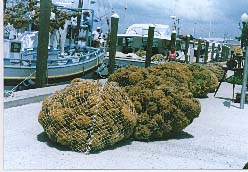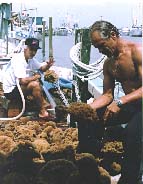In his native Greece, Zacharias had seen pictures of Tarpon Springs,
Florida. Five years ago, he saw the town for himself and decided to
call it home.
The Sponge Docks where unique Greek shops feature clothes and other
items from all over the world as well as sponges brought up from waters
off its own coast, restaurants with unbelievably delicious Greek and
sea foods, and the historical downtown district continuously draw tourists
from all over the world.

These sponges have been cleaned and sold to one of
several shops at the Sponge Docks where
tourists from all over the world take
home something from the Gulf of Mexico.
But Zacharias wasn't interested in tourists and the sights of the
city. It was the abundance of sponge that drew him west. The sponge
most people recognize as a tool for cleaning purposes, the sponge
a highly porous sea critter with no internal organs and no capability
for free movement.
This marine organism made Zacharias a living in Greece. Zacharias
felt right at home on the Sponge Docks in Tarpon Springs, on the Anclote
River, which opens into the waters of the Gulf of Mexico.
The divers here are mostly Greek, having immigrated from the Greek
Islands starting in about 1905.

Zacharias, who came to America
to make his living as a sponger
in Tarpon Springs, Florida,
checks the quality of his sponges.
Zacharias, who began diving for sponge in the island of Calymnon,
Greece at age 12, sold his boat at home and bought a new boat here,
naming it too, "The Zacharias." Then he took a bride, Angie,
and the two went into the sponge business together. They were the
entire crew in the beginning, with Zacharias diving and Angie guiding
the boat.
Once Zacharias got the business going, he found he could make a reasonable
living here as a sponger. But the work isn't easy and sponge diving
help is hard to find.
Sponge divers must be trained to go deep into the water to gather
sponge by using a rake, like those used for raking leaves, but with
the teeth spaced five inches apart. When divers rake sponge off the
ocean or gulf beds, some of their slimy membrane will remain attached
to the rock and will grow back, bringing a new harvest for a future
diver.
"I come experienced. Few people are experienced. Just old-timers,"
said Zacharias, age 55.
Aboard the "Zacharias," local merchant John Klonaris helps
Zacharias clean the sponge by water blasting.

A merchant at the Sponge Docks,
John Klonaris gives Zacharias a hand
with his crop by water-blasting the
tiny sea critters living in the sponge pores.
On the day before, Zacharias had dived alone, close to home and in
just 30 feet of water.
With a crew of three divers, he'll venture into deeper waters. "If
I go out for two or three days, I get 2,500 sponges. Yesterday I get
200. Going back out tomorrow."
On this day, last fall, Zacharias was unhappy with what he saw in
the gulf. "Sponges are going dead with some disease. I don't
know why. Many places, sponge are all dead."
Another sponge boat, the "Klymnos" comes in with a good
harvest, but grim news. "You know, out there the sponge are dying,"
said Eric Jeakins, a 14-year-old deck hand.
Many sponges died off the shores south of Tarpon Springs in the fall
of 1995. Experienced divers suspect the cause was the "Red Tide"
-- an algae bloom that often plagues the waters off Florida's west
coast, killing fish by the thousands. However, marine life experts
are not sure that's what happened with the sponges.
Charlie Smolios, a sponger on the "St. Phillip," has seen
the Red Tide's effects before. In '47 he had a super-good sponge business
going when the algae bloom hit with devastating effects.
Harvested still alive, the sponge will last a long time. Dead for
a week or two; it will disintegrate in the diver's hand, "poof"
like breaking a sand structure, Smolios said.

Aboard the sponge boat bearing his name,
Zacharias checks for barnacles on a sponge
after it has been cleaned by water-blasting.
He would prefer this "yellow" sponge
were the more desirable "wool."
Some divers blamed Hurricane Allison for the sea problems, which
swooped along the gulf waters in June of '95. Still, today, the boats
go out and return loaded with sponges.
The 1947 Red Tide outbreak was the worst on record, wiping out the
region's sponge beds. Recovery took several years.
Today, without the threat of a kill-off, the business is precarious.
"There are not enough people here to dive," said Zacharias,
who wants a three-diver crew. "Everybody here has a problem getting
a crew.
"Tourists ask many questions about sponges but no people interested
in working. The most interested are people who don't have money. (They)
come to the boat, sleep on the boat, eat on the boat."
Not just anybody can get a job on a sponge boat, and those who do
will probably work for low wages.
It's work with unusual hazards, too. Many divers wear wetsuits for
protection under water. Zacharias dives in street clothes and heavy
workboots, wearing long pants and long-sleeved shirt. Though the "water
is very hot," he wears the clothing for protection from sea grasses
that "bite like mosquito" and "is very dirty, you know."
Decompression -- the bends -- is a possibility, but no one Zacharias
has been acquainted with has suffered it.
"If you use your head, brain, nothing happens. The deeper down,
the slower to come up. Nothing making me afraid," he said.
"I see a lot of fish in Greece. I never see big shark here. I
see some shark. I look for sponges. I don't look for shark. Nothing
happen here to divers. If you see any shark, it's very few."
The cost of business isn't cheap. Zacharias paid $110,000 for his
boat, used.
"If you are experienced and you know what you are doing, you
make a living," he says. "The price is going down. Some
give sponges cheaper. The prices go down. That don't make it easy."
If anyone's getting rich, state statistics don't show it. Last year
about 360,000 sponge were plucked from Florida's west coast waters,
making sponging a $1.4 million industry, with $590,000 of that figure
earned by 91 west coast spongers.
About the writer. . .

Patricia Lieb, Editor
Writer, Photographer
Patricia Lieb is a staff writer for The Suncoast News,where
she covers the town of Dunedin, Florida, located between Tarpon
Springs and Clearwater Beach on the Gulf of Mexico.
Before joining The Suncoast News, Pat worked for several other newspapers,
including The Daily Sun Journal in Brooksville, Florida, where she
covered crime, courts and city government. She was a feature writer
for the Daily Journal in Kankakee, Illinois for three years prior
to moving to Florida in 1987 and was one of the first journalists
to join the staff at the Bourbonnais Herald in Bourbonnais, Illinois
when it began publication in 1976.
In the early 1980s Pat was the coeditor/co-publisher of the literary
magazine,
Pteranodon, and the Pteranodon chapbook series. In 1975 she was
an editor with the Kankakee Area Writers' Group, in Kankakee, Illinois,
to compile American Thoughts, a book of more than 200 pages compiled
by the group in celebration of this country's 1976 bicentennial
year.
Pat has served as a speaker at numerous writer's conferences including
the Annual Florida Suncoast Writers' Conference at USF in St. Petersburg.
Pat's fiction, articles, and poetry have appeared in numerous literary
and national magazines, as well as publications for teenagers including
Scholastic Scope and Star. To contact Pat, send e-mail to editor@writeonmag.com.
back to top
|

![]()

![]()




